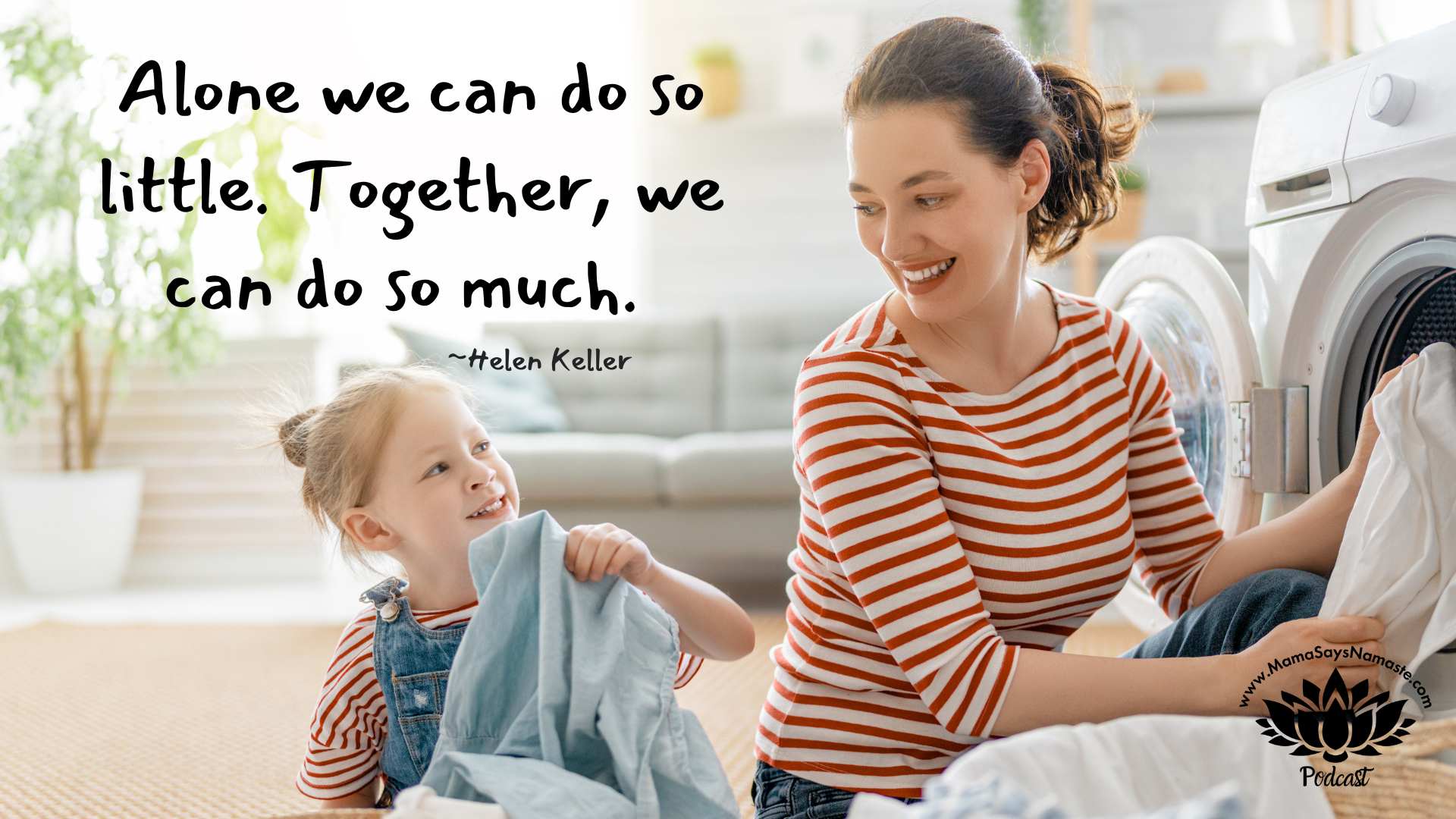Have you ever considered the invisible load of managing a home? Those countless tasks and the mental and emotional energy it takes to keep the household running smoothly? I've heard enough about the invisible, mental, and/or emotional load of running a household. There are so many variables to consider!
As I was scrolling through my Instagram feed one day, I stumbled on the post I have below - and it was affirmation after affirmation on what I so strongly feel - so it was time for us to do a podcast episode on it!
Moving Beyond the "Chore List"
I am so guilty of creating lists for everything. The instant I start to feel stress/pressure around the to-dos, a list is made. It helps me gather my thoughts, organize my priorities, and take the weight out of my mind to a piece of paper I can manage.
The day-to-day tasks in our home are oftentimes reduced to a list when it comes to what we want our children to do. I know many, many families (ours included) created checklists with our kids or simply assigned them chores to check off on a daily or weekly basis.
Yet, have you ever considered what all it took for you to actually create the chore list?
This was like an epiphany to me as I was reading this post:
Wait a second - you mean all my frustration over what they don't notice was because I was handing them a perfectly curated list already??
Hello!
The Invisible Load: Noticing and Doing
How much time have you spent helping your children see with the eyes of responsibility that can discern what needs to be done to maintain a household?
I wanted to approach our chores and household maintenance from a family-centered perspective, one that is built on awareness, intention, and actively involving our kids in lightening the mental load.
Let's break down the key takeaways and tips from the episode to help families create a more harmonious and empowered home life.
Empowering Children Through Awareness
Awareness is huge. From a very young age, we've always worked with our children to recognize their impact.
One of the greatest resources when our children were little was the book, Have You Filled A Bucket Today? I have to say, I've seen better-illustrated books. That being said, the content is spot-on. I was amazed at how well even our 2-year-old could grasp the concept of filling (or depleting) our energy buckets.
It was an excellent book for our young kids to learn about give and take, and how even things like our tone of voice and kindness to others can "empty someone's bucket".
Mental Load
When you talk mental load, how can you lay this out for your family? I asked AI on Bard to describe for me what mental load in a household may look like:
Mental load, also known as "cognitive labor" or "worry work," refers to the invisible, unpaid work involved in managing a household and family. It includes all the planning, organizing, and decision-making that goes into running a smooth and efficient home. While physical chores like cleaning and cooking are often more visible, mental load is often overlooked and undervalued.
Here are some examples of mental load in a household:
Planning and organizing:
- Making to-do lists and schedules
- Keeping track of appointments, deadlines, and events
- Planning meals and grocery shopping
- Arranging childcare and transportation
- Managing household finances
Decision-making:
- Choosing what to eat, wear, and buy
- Making decisions about home repairs and maintenance
- Resolving conflicts and mediating disagreements
- Providing emotional support and guidance to family members
Anticipating and preventing problems:
- Remembering birthdays, anniversaries, and other special occasions
- Keeping track of household supplies and stocking up when needed
- Identifying potential problems and taking steps to prevent them
- Monitoring family members' health and well-being
Mental load can be a significant burden, especially for women who often shoulder the majority of this work. It can lead to stress, anxiety, and burnout. It can also strain relationships and make it difficult for women to pursue their own goals and interests.
Emotional Load
I took it a step further to add in the emotional load. See, when we discuss an "Invisible Load", it includes both the mental and emotional loads we carry beyond the tangible chore list.
Here is what AI explains about "emotional load":
Emotional load, as opposed to mental load, refers to the management of emotions within a household. It involves regulating one's own emotions, as well as the emotions of others, such as children or partners. Emotional labor can be just as draining as physical or mental labor, and it often falls disproportionately on women.
- Calming distressed children: When a child is upset, it's often the parent who takes on the role of comforter. This can involve soothing the child's emotions, helping them to understand their feelings, and resolving any underlying issues.
- Mediating conflicts: Parents often act as mediators between their children, siblings, or even partners. This involves listening to different perspectives, trying to understand each person's feelings, and finding a compromise that everyone can agree on.
- Anticipating and preventing emotional problems: Parents are constantly on the lookout for signs that their children might be struggling emotionally. This could involve noticing changes in behavior, mood, or sleep patterns. Once a problem is identified, parents can then take steps to address it, such as talking to the child, seeking professional help, or providing additional support.
- Providing emotional support: Parents are often the first line of emotional support for their children. This means being there to listen when they need someone to talk to, offering encouragement and advice, and simply being a shoulder to cry on.
- Maintaining a positive home environment: Parents play a crucial role in creating a positive and supportive home environment. This means modeling healthy behaviors, expressing love and affection, and resolving conflicts constructively.
Emotional labor is an important but often invisible part of running a household. It can be a source of stress and burnout, but it can also be a source of great satisfaction. When emotional labor is shared equitably, it can create a more harmonious and supportive home environment for everyone involved.

Shifting from Chores to "Notice and Do"
Maybe, instead of printing off that traditional chore chart template, you take a "notice and do" approach with your family. Imagine the proactivity and responsibility our family may be capable of if they weren't simply waiting on us to be their eyes.
Here's an example of how we switched from just doing "chores" to more of this "notice and do" approach. My husband Nathan decided that he would no longer cook around a messy kitchen. We'd made the demands, and assigned the roles, and they were often avoided.
It wasn't that our children didn't understand what needed to be done; it was that they didn't really care. Especially when they were young, heck, they couldn't see over the counter to even see the mess, right? So the kids would be hungry, and we were tired of asking everyone to help out and oftentimes us parents taking over to just make things happen.
Yet, when Nathan shifted it to, "we can eat when we have a clean kitchen," all of a sudden, the girls had a personal interest in ensuring the kitchen was tidy. All of a sudden, they could use common sense that if there were dirty dishes in the sink and dirty counters, it wasn't as easy for Daddy to make an amazing meal.
So we started hearing the "I'm hungry" statements and would ask, "Is the kitchen ready for the chef?" We wanted to set them up for success - so it's not like you start from nothing. We had already spent the time helping them to see what needed to be done and what Mommy's "minimum standard of care" looked like.
The Long Game: Grace and Empowerment
We wanted to empower them as contributing members of the family team, capable of making an impact and having a voice in the family.
And we noticed the shift - from a statement that required us to carry the mental and emotional load - the invisible load - of parenting, to a family-centered approach where now, more often than not, before the "can I..." requests of what they want, our children are proactively looking at what they can contribute first.
They don't even mention hunger when the kitchen is a wreck. They recognize what it'll take before a new meal can be made, and now, they value knocking it out right after a meal so we all enjoy a clean kitchen that is ready for a snack or meal at any point.
This is a long-term perspective. Your kids won't be super observant and intuitive in a day. Give some grace for the process. Yet recognize the more patience you can have where you're willing to explain and enlighten as you do, the more you're equipping them to "notice and do" on their own. Yes, many of our "notice and do" tasks started with us simply narrating what we were noticing and doing in our day-to-day tasks.
We want to foster personal growth and autonomy. That has to include recognizing what things need to be done without simply being told to do it. And when does this happen? Do you just flip a switch and your child turns from a kid to a responsible adult?
Your Challenge:
Our challenge to you this week is to set aside the chore chart and engage your kids in a conversation about noticing and doing in your home.
Ask your kids what they notice needs to be done and what solutions they can suggest.
Encourage them to be proactive and play a part in lightening the family's mental load.
It's about shifting the focus from chores to awareness and empowering your children to actively participate in managing the home.

Let's work together to nurture our family connections and create a more harmonious living space for all of us!
Remember, it's not about doing it all ourselves or hounding our kids with a chore list. We all have insights and perspectives that may benefit and strengthen the home we're striving to create. "The uniqueness in each of us strengthens all of us." Namaste, Mama.

